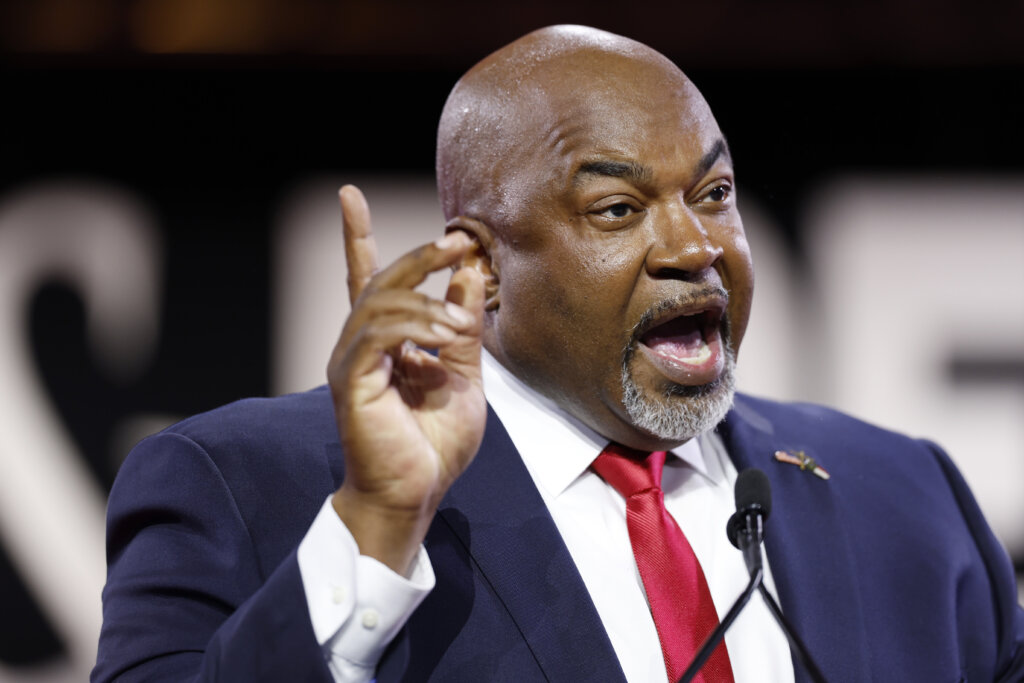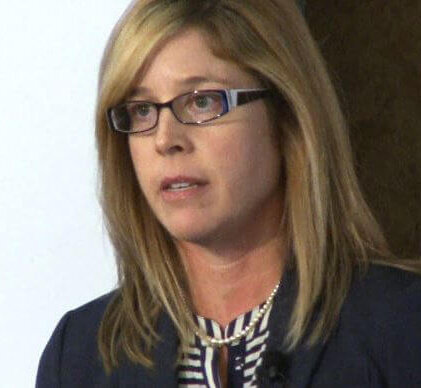Josh Stein — who would be North Carolina’s first Jewish governor — threads the needle on Gaza
Stein is talking about Israel and Gaza more gingerly than another Jewish Josh — Pennsylvania Gov. Josh Shapiro

Josh Stein speaks during a Get Out the Vote event in Charlotte on Nov. 6, 2016 when he was a candidate for attorney general. Photo by eff Hahne/Getty Images
Editor’s note: Election returns show Josh Stein will be the first Jewish governor of North Carolina.
This story was first published in The Assembly.
Days after October 7, when America still seemed united in its revulsion at Hamas’ massacre and kidnapping of Israelis, North Carolina Attorney General Josh Stein spoke at a mournful event in Raleigh and wrote a letter of solidarity to the Asheville Jewish community, which was also gathering to grieve.
“Dates like December 7, 1941, and September 11, 2001, are etched in our minds forever as Americans. Now, October 7, 2023, will forever be indelibly marked in the hearts of Israelis,” he wrote, ending with, “We stand with Israel.”
This was personal for Stein: He’s a member of Temple Beth Or, a Reform Jewish congregation in Raleigh, and would be the first Jewish person elected governor of North Carolina if he wins in November.
But soon, and for months, most of the headlines and TV news footage would be about deep divisions within the Democratic Party over Israel, the ongoing war in Gaza, and pro-Palestinian protests on college campuses.

Republicans—including Stein opponent Lt. Gov. Mark Robinson, who has made antisemitic comments in the past—have sought to exploit this split. They’ve rebranded themselves as the real supporters of Israel, and called on Stein and other Democrats to criticize antisemitism in their own ranks.
This uncharted territory has been particularly perilous for Democratic candidates.
Starting with President Joe Biden, they can’t afford to lose the votes of any group that’s traditionally been part of their party’s coalition, including those who have an emotional and spiritual bond with Israel and haven’t forgotten the Holocaust; progressives who are critical of Israeli Prime Minister Benjamin Netanyahu’s right-wing government and aghast at the thousands of Palestinian civilian casualties; and young people and people of color, many of whom see Israelis as colonizers and the Palestinian cause as akin to the Black Lives Matter movement. There are Jewish voters in each of those groups.
How is Stein responding to it all?
Carefully.
He appears to be threading the needle on reacting to the most contentious developments, with nuanced statements from him and his campaign and on-the-one-hand, on-the-other-hand answers during infrequent interviews.
When pro-Palestinian protesters marched across the UNC-Chapel Hill campus in May, Robinson stressed law and order, and praised interim Chancellor Lee Roberts for calling in the police.
Stein offered a more even-handed reaction, saying in a statement to reporter Bryan Anderson: “The right to free speech is fundamental, and students should be able to exercise it peacefully. But any antisemitism, violence or other acts of hate are unacceptable. The safety of all students is critical.”

Contrast his judicious tone with that of Pennsylvania Gov. Josh Shapiro, another prominent Jewish politician. According to a recent New York Times profile in the wake of the campus protests, the outspoken Shapiro “has dived headfirst into subjects that have wrenched apart his party.”
Unlike Stein, though, Shapiro is not on the ballot this year.
Asher Hildebrand, a Duke University public policy professor who previously worked for Democratic U.S. Rep. David Price, told The Assembly that Stein is “doing everything he can to remain above the fray of some of the more divisive [foreign policy] debates that, as attorney general or as governor, he has very little say over. … He doesn’t need to be out there either leading the battle charge or defending against the battle charge when it comes to U.S. policy over Israel or Netanyahu.”
‘Intifada Revolution!’
That local and state public officials and candidates usually have little or nothing to do with foreign policy hasn’t stopped those determined to make Israel and Gaza an issue at city council meetings, in the halls of the legislature, at state party meetings, and even in encounters between voters and campaign volunteers.

That has been especially tricky and even dispiriting for North Carolina Democratic politicians who, like Stein, are Jewish and sometimes get criticized from both sides.
Asheville Mayor Esther Manheimer, who is Jewish and had her rabbi at her swearing-in ceremony, estimated that protestors had demanded the city council adopt a cease-fire resolution at six meetings. At one meeting, a group of Asheville residents in their 20s chanted, “Intifada revolution!” Intifada is an Arabic word for rebellion or uprising.
“When I hear somebody calling for intifada revolution, it’s like somebody calling for violence against Jews,” Manheimer said. “When I condemned them for saying that, I got a lot of pushback from them. They said, ‘What’s wrong with that? It just means revolt. It doesn’t mean anything bad.’”
She also heard from some in the Jewish community, who told her, “‘You didn’t go far enough. … You need to condemn people who said this word or that word, used this phrase or said that thing.’”
In Mecklenburg County, Nicole Sidman is the Democratic state House candidate trying to unseat Republican Tricia Cotham, formerly a Democrat. Sidman is Jewish and works as the director of congregational life at Charlotte’s Temple Beth El, the largest synagogue in the Carolinas.
In her campaign, Sidman said, she’s mostly talked about appropriating more money for public schools, opposing restrictions on abortion, and helping support vetoes by, she hopes, future Gov. Stein.
But, Sidman reported, two friends helping her on the campaign encountered voters who seemed more interested in her Judaism and her views on Middle East tensions.
One of the voters told her friend, “I would never vote for a Zionist,” Sidman said. “And I had a friend, she was working at a polling place, and someone said to her, ‘What is [Sidman’s] position on Gaza?’ And my friend said, ‘I literally have no idea,” before offering her positions on matters a state legislator would typically deal with.
The first in a series of headlines that showed the North Carolina Democratic divide on Israel and Gaza came shortly after the Hamas massacre. The General Assembly doesn’t often debate foreign policy, but 16 Democratic legislators refused to back a resolution supporting Israel and condemning the Hamas attacks.
Some of those who opposed it said it made no mention of the plight of Palestinian civilians in Gaza, whose homes and hospitals were being bombed by Israeli forces. Hamas, hiding in underground tunnels, has used civilians as human shields.
A month later, the state Democratic Party’s executive committee voted 17-16 against recognizing the Jewish Caucus. “I sent an email to chair [Anderson Clayton], saying ‘What are you doing? I can’t believe this!” said Manheimer. “What a betrayal.”
Stein told radio station WFAE in Charlotte that he was “disappointed” the caucus wasn’t approved, but signaled that he would work behind the scenes with Clayton “to find a path forward” and embrace North Carolina Jewish Democrats “who feel silenced and isolated during a time of rising antisemitism.”
A month later, the Democratic committee reversed itself, welcoming the Jewish caucus.
Stein stays on message
Putting out one fire did not extinguish the intraparty tensions over Israel. They have remained, and they mirror the story with the national Democratic Party.
Hildebrand told The Assembly that the Democratic politics of U.S. policy toward Israel have been evolving for a long time.

The biggest changes, he said, were for more support—even among American Jews—for the idea of a Palestinian state, and more criticism of Israeli policies from Netanyahu and others who undermined that so-called two-state solution. “What October 7 and its aftermath did was to put that [Democratic] diversity of views on full display for the public,” he said.
Including, he added, the more critical stance toward Israel among younger voters, “who have grown up, with their entire lived experience of Israel not as a beleaguered victim within its region, but as a powerful force that has, in their experience and in their views, been as much the aggressor as the victim.”
Stein told the News & Observer last year that a two-state solution was the answer to a “permanent resolution” in the region. And, with heart-wrenching scenes of dead or malnourished Palestinian children in bombed-out Gaza landing in American living rooms, he offered, again, a carefully-worded view of what should happen—one that echoed Biden’s.
“Hamas represents a real threat to Israel,” he told the N&O. “Israel is justified to try to address that threat. They have to do it in a way that minimizes … the impact on civilians because there are a couple of million Palestinians who live in Gaza who have nothing to do with Hamas, and are just trying to live their lives.”
In more recent months, as American politics have been buffeted by images from a war 6,000 miles away in Gaza and police battles with campus protesters in Chapel Hill, Charlotte, and across the country, Stein’s main focus has been elsewhere.
He’s been on the road, meeting with voters, raising campaign cash, firing up Team Stein supporters, promoting his record as attorney general, listing the ways he’ll fight for families as governor, and ripping Robinson’s “job-killing culture wars” agenda. He’s also campaigned in several Republican-leaning small towns and rural areas in search of potential ticket-splitters.
The Assembly wanted to interview Stein about his faith and related issues. His campaign said no. But we were able to ask him a question at a recent event in Charlotte.
Q: If you’re elected, you’ll be the first Jewish person to become governor of North Carolina. And you’re running at a time when we’ve seen a rise in antisemitism, a divided Democratic Party over Gaza, and campus protests. How do you navigate that changing political terrain?
His long answer began this way: “I’m running to fight for people and make a difference in people’s lives, not to make history.”
He then added: “If you show voters who you are and what you’ve been about … and let folks know that ‘Hey, he’s going to look out for me. He did it as attorney general and [with] the issues he’s talking about in the governor’s race.’ … That’s how I think you win elections.”
The rest of his answer was a list, repeated often in his polished stump speech, of fighting for “communities devastated by opioids,” “children who want to go to good public schools,” “people who desperately need health care,” “women who should have the right to make decisions about their own bodies,” and “families whose drinking water has been poisoned by polluters.”
He didn’t mention Israel, divisions in the Democratic Party, or campus protests.
A Molotov cocktail in Charlotte
Stein appeared to have his campaign roadmap planned out by January 2023, nearly two years before the actual election. His pitch, his targets, even how he wanted to couch his faith—everything was spelled out in a three-minute video he released that month to announce his run for the state’s top job.
It opens with images of two shadowy figures lighting a match, then igniting a Molotov cocktail. The stark background music, which sounds like somebody repeatedly stabbing a piano key, heightens the sense of menace.
“It was a couple of hours before dawn, a cold February morning in 1971, in Charlotte’s west end,” said Stein, who goes on to tell the story of the firebombing of law offices shared by three civil rights crusaders—Julius Chambers, James Ferguson, and his father, Adam Stein. These members of North Carolina’s first racially integrated law firm were targeted, he added, for “leading the legal battle against discrimination and for equality.”
The camera then cuts to Stein, dressed casually in a brown coat, blue sweater and open-collar white shirt. “I learned early on that some things are worth fighting for,” he said. “No matter the opposition.”
The video then segues to images of what Stein called modern-day “bomb-throwers”—torch-carrying antisemitic marchers in Charlottesville, Virginia, raucous insurrectionists invading the U.S. Capitol, and “politicians [who] spark division, ignite hate, and fan the flames of bigotry.”
On cue, clips of Robinson speaking at conservative churches in North Carolina appear, with the state’s first Black lieutenant governor dismissing LGBTQ people as “filth,” saying God called men—not women—to lead, and railing against abortion.
Then there’s a series of testimonials trumpeting Stein’s record as attorney general, all casting him as a caring fighter who took on corporate greed, tackled the rape kit backlog, and stood up for devastated families by attacking the opioids crisis.
Finally, Stein wrapped it up by echoing some of the core missions of the Raleigh synagogue he and his family attend —Temple Beth Or, Hebrew for House of Light.
“My faith teaches me that we’re all children of God,” he said over a scene of him walking outside with his wife, their three grown children, and their dog. “And that we’re called to make a difference.”
Pennsylvania’s Gov. Shapiro
Stein’s campaign has some similarities to the one Democrat Josh Shapiro ran two years ago in Pennsylvania. Shapiro was then the state’s attorney general and, like Stein, stressed his success in going after opioid manufacturers and other powerful forces “on behalf of those who’ve been wronged,” as he put it in his first campaign ad.
Shapiro also faced a far-right MAGA Republican opponent, Doug Mastriano.

“We beat a dangerous extremist like Mark Robinson here in Pennsylvania in 2022,” Shapiro said in a social media post in March, after Stein, who had worked with Shapiro when both were attorneys general, won the Democratic gubernatorial nomination. “It took a hell of a lot of work and support from folks like you — and now, we need to do the same thing in North Carolina. Chip in to help my friend Josh Stein defend our fundamental freedoms.”
Shapiro, who is being called a future presidential candidate, has leaned into his faith. As The New York Times put it recently, “his Jewish identity is intertwined with his public persona to a degree rarely seen in American politics.”
Shapiro began that first campaign ad in 2022 with video of him and his family sharing a Shabbat meal. Wherever he starts his day, Shapiro said in the ad, “I make it home Friday night for Sabbath dinner, ‘cause family and faith ground me.”
This year, Shapiro has been outspoken about the anti-Israel protests on college campuses, blaming universities for failing to teach students “information that is necessary to form thoughtful perspectives.” He told The New York Times last month that too many of the protests spilled over into antisemitism: “If you had a group of white supremacists camped out and yelling racial slurs every day, that would be met with a different response than antisemites camped out, yelling antisemitic tropes.”
Stein has been more cautious in speaking out and in sharing the particulars of his faith with the public, although he hasn’t hid his Judaism. “From our Seder table to yours,” he posted on social media in April, “we hope folks celebrating across North Carolina have a meaningful and happy Passover.”
Shapiro governs a state that has far more Jews than North Carolina—433,660 to 48,935, according to The American Jewish Year Book 2023. And he is the state’s third Jewish governor, not its first.
Several people interviewed by The Assembly said that Stein’s career in public service and his stance on issues reflect Jewish values. Stein, 57, grew up in Chapel Hill and graduated from Dartmouth and Harvard Law School before teaching English in Zimbabwe and working for the Durham-based Self-Help Credit Union. He later served in the state Senate, led then-Attorney General Roy Cooper’s consumer protection team, and is now completing his second term as attorney general.
U.S. Rep. Kathy Manning, a Greensboro Democrat and the only Jewish member of the state’s congressional delegation, said Shapiro and Stein demonstrate their Judaism in different, but equally authentic ways.
“For Governor Shapiro, the critical importance of his Judaism to him and living outwardly a very Jewish life is who he is,” said Manning, former board chair for the Jewish Federations of North America. “Josh Stein has authentically been a public servant … and he leans into his Jewish values. They are the values that led him to emphasize the importance of education, health care, working to combat discrimination, working to make sure that everybody has the right to vote and the opportunity to get ahead.”
Stein is active in a synagogue in Raleigh that adheres to the tenets of the Reform movement, the largest stream of Judaism in the United States. It’s known for a more liberal approach to Jewish law and for its commitment to social justice issues.
That commitment “is deeply rooted in the Hebrew Bible,” said Rabbi Judy Schindler of Charlotte, who has been serving the Jewish and broader community for 25 years. “From Abraham’s fight in defense of the innocent of Sodom and Gomorrah to the Prophets who envisioned and called for justice for all — especially those who are most vulnerable in the margins of society.”
MLK and Rabbi Heschel
On a Sunday afternoon in May, Stein came to Reeder Memorial Baptist Church in Charlotte for a “Faith Leaders for Stein” luncheon.
There was a local rabbi at one of the round, blue-clothed tables in the church’s fellowship hall. But it was mostly a gathering of African-American preachers, the local leaders Democrats often rely on to turn out the party’s most loyal voters.
And Stein’s guest speaker — the one who really fired up the crowd — knew politics: He is a Black preacher who also happens to be a U.S. senator from Georgia. Not only that, Sen. Raphael Warnock is the pastor of Ebenezer Baptist Church —the house of worship in Atlanta once led by the Rev. Dr. Martin Luther King Jr.
But before the crowd could hear from the speakers, there was an opening prayer invoking Jesus and then it was time to eat. Warnock, Stein, and the preachers lined up to fill their plates with steaming hot portions of jerk chicken, curry chicken, rice and beans, mac and cheese, and cabbage. To be washed down by sweet ice tea and lemonade.
Stein was first at the lectern. On this day, he was more warm-up act than star.
He gave an 11-minute version of his stump speech, though he added some allusions from the Hebrew Bible, which the Christian preachers looking on knew better as the Old Testament. “Just like when David slew Goliath,” Stein told them, “we know that some things are worth fighting for.”

Next up was Warnock, and it didn’t take long before the preachers in their seats were seconding his words with short shouts of “yes sir!” and “that’s right!”
It soon became clear why Warnock was such an inspired choice to make the case for Stein. He reminded the crowd of how African Americans and Jews have historically been both victims of discrimination and partners in the fight for equality.
He started by telling the story of the election, on the same day in 2021, of himself and Jon Ossoff to the U.S. Senate. “Georgia, a state in the old Confederacy, did an amazing thing,” he said. “It elected its first African American senator and its first Jewish senator … in one fell swoop.”
The two victories gave Democrats control of the U.S. Senate.
“I think somewhere in glory … Martin Luther King Jr., and Rabbi Abraham Joshua Heschel were giving each other the high five,” Warnock said, reminding the crowd of a famous pairing of two civil rights titans who marched together in the 1960s.
Then Warnock brought it back to North Carolina for a third example of African Americans and Jews working together for justice.
“Josh is a great guy. He comes from great stock. I’m inspired by the story of his father,” the senator said, referring to the Charlotte legal team Stein, Chambers, and Ferguson, who sat in the audience that day. They brought and won landmark cases targeting discrimination, including the racial segregation of public schools.
Warnock dismissed Stein’s opponent with a quip: “Donald Trump and Mark Robinson are two peas in a pod.”
Tied to Biden
North Carolina will make history in November no matter who wins the governor’s race. Stein would be the first Jew to lead the state; Robinson would be the first Black governor. So far, that story has gotten more attention from the press outside North Carolina, including CNN and MSNBC, both of which interviewed Stein.

The national media and the Jewish press—even newspapers in Israel—have also focused on Robinson’s long list of controversial comments about Jews and others. A headline in The Jerusalem Post’s world news roundup: “Governor race pits Jewish Democrat against Republican accused of antisemitism.”
In a Facebook post before Robinson entered politics, he called reports of the Holocaust “hogwash.” In another, he said an “agnostic Jew” in Hollywood had made the movie Black Panther “to pull the shekels out of your Schvartze pockets,” using a Yiddish racial slur and the word for money in Israel.
Salisbury lawyer Bill Graham, one of Robinson’s opponents in this year’s GOP gubernatorial primary, ran TV ads calling attention to the lieutenant governor’s denial that the Nazis had killed six million Jews.
Robinson, who is popular with the large MAGA wing of the GOP, ended up winning the primary with 65 percent of the vote. But a recent episode of The Focus Group podcast that interviewed North Carolina voters suggests that the ads did break through enough to cost Robinson votes in November, among even some 2020 Donald Trump voters.
Robinson has downplayed his past comments, saying “there may have been some Facebook posts that were poorly worded.”
At a Republican rally in Greensboro in March, Trump nodded to Robinson’s ability to stir a crowd, calling him “Martin Luther King on steroids.” (Actually, Robinson has called King a Communist on social media and in his 2022 memoir.)
Steve Schewel, Durham’s second Jewish mayor and a Stein supporter, isn’t buying the idea that speechifying talent will erase the stink of Robinson’s extremist comments with most voters. “Yes, Robinson is a thundering orator, but he’s a thundering orator who’s an antisemite, a homophobe, a misogynist,” said Schewel, who served as mayor from 2017 to 2021.
In a recent ad, the Stein campaign used a clip of Robinson shouting other controversial words. “Abortion in this country is not about protecting the lives of mothers,” Robinson said. “It is about killing the child because you weren’t responsible enough to keep your skirt down.”
Still, Robinson’s personal story — he grew up poor, the ninth of ten children —c ould attract some voters. And in the Bible Belt, his very public Christian faith could win over others. Robinson starts every speech by thanking Jesus.
He’s also embraced and spoke about the history he’d make if elected the state’s first Black governor. Then there’s his close identification with Trump, who leads Biden in the latest polls in North Carolina.
The Rev. Ricky Woods, pastor of First Baptist-West, Charlotte’s oldest African American church, told The Assembly he’s less worried that Black voters will cast a ballot for Robinson than that they’ll stay home. And for young Black voters, he added, the threat is that they’ll sit out the election partly because of their simmering objections to the cost of Israel’s war on Palestinian civilians.
“The way they’re going about executing this war is problematic from a justice standpoint,” said Woods, who stressed that he is not pro-Hamas. “I’d be interested in hearing more [from Stein] in terms of what his ideas and thoughts are.”
In March’s Democratic primary, 89,000 voters—nearly 13 percent—chose “No preference” over Biden, a sign that many were unhappy with the president’s decision to send U.S. arms to Israel. More recently, Biden has challenged Netanyahu’s conduct of the war, even proposing a cease fire. But he is still in danger of losing the support of many young voters.
Hildebrand, the Duke professor, said while Gaza is more Biden’s problem than Stein’s, the president needs to be competitive in the state come November, even if he doesn’t ultimately end up winning North Carolina’s 16 electoral votes.
“Stein can win North Carolina even if Biden loses it by a couple of points,” said Hildebrand. “But if Biden loses it by too much, then it’s awfully hard for Stein to overcome that. So I do think that’s the way [Gaza] becomes a broader [threat] for down-ballot Democrats.”
In late May, the Cook Political Report, the gold standard among election prognosticators, changed its forecast of the North Carolina governor’s race — from leans Democratic to tossup.
This story was first published in The Assembly.





















